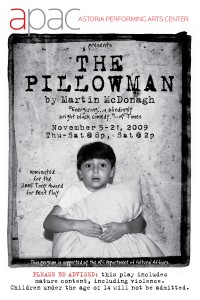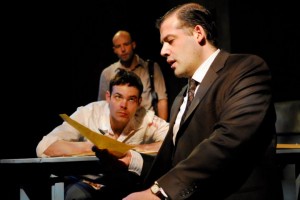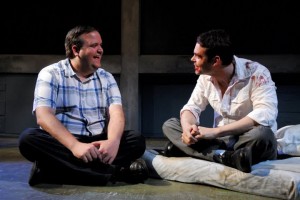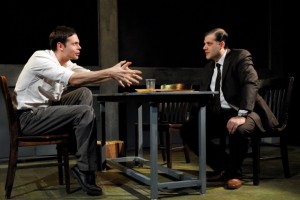 If you know nothing at all about The Pillowman by Martin McDonagh you might mistakenly allow the deceptively downy title to lead you to believe this is a play about security and comfort. However, if The Pillowman brings up recollections of what you know about the Tony Award nominated 2005 Broadway run — and you still can’t resist the dark siren song of The Pillowman — then the new production being put on by the Astoria Performing Arts Center (APAC) is just what you’ve been looking for.
If you know nothing at all about The Pillowman by Martin McDonagh you might mistakenly allow the deceptively downy title to lead you to believe this is a play about security and comfort. However, if The Pillowman brings up recollections of what you know about the Tony Award nominated 2005 Broadway run — and you still can’t resist the dark siren song of The Pillowman — then the new production being put on by the Astoria Performing Arts Center (APAC) is just what you’ve been looking for.

Richard D. Busser (Ariel) looks on at Avery Clark (Katurian) and Seth Duerr (Tupolski). Photo: Jen Maufrais Kelly
This production of The Pillowman (Directed by Tom Wojtunik) is just about as perfect as a dark, dark, dark (DARK) comedy can get. With an almost Tim Burton like magic thanks to a team of talented designers who spare no morbid, gory detail, The Pillowman vacillates between the real time story of the writer, Katurian Katurian (Avery Clark) and the dreamy reenactments of the horrific stories he’s written.
We first come upon Katurian (full name Katurian Katurian Katurian) as he is being interrogated by Detective Tupolski “I’m a detective … I detect” (played with deliciously smarmy arrogance by Seth Duerr), and Police Officer Ariel “He’s a police officer … he polices” (played by Richard D. Busser who percolates with pent-up nervous cop energy). Katurian has been taken in because he’s a writer of 400 stories which often depict the brutal death or torture of children. Now, with the bodies of two dead children turned up – both murdered according to ghastly methods detailed in Katurian’s stories – he becomes the prime suspect. On the line is the life of another child, a deaf girl who’s gone missing and is presumed dead. Katurian is being pressed for details which he simply can not provide since he has no connection to these murders. Does he?

Nathan Brisby (Michal) and Avery Clark (Katurian). Photo: Jen Maufrais Kelly
Whipped into this odd grouping is Katurian’s older brother, Michal who (despite his years) has the mental capacity of a child due to … well … that’s part of both the story of The Pillowman as well as one of the stories that Katurian has written. Suffice it to say, Katurian was the favored of the two children, and being the much-doted-upon child has left him with both a blessing and a curse – all in the embodiment of Michal (Nathan Brisby).
Fans of Edward Gorey can see echoes of his iconic little pen and ink children in the yarns spun by Katurian, some of which are simply read aloud, some of which are re-enacted. It would be but a small step from Katurian’s The Little Apple Men to Gorey’s The Gashlycrumb Tinies and therefore even easier to understand Katurian’s blind spot when it comes to his own writing. To paraphrase Freud – sometimes a story is just a story.
Katurian Katurian is a writer who had the (somewhat engineered) seed of imagination planted into his head by his parents; his talent was encouraged and then slowly tweaked to grow darker and darker. Still, to Katurian these are only stories, clever ones at that, morality tales some … cautionary tales, others …but only stories, not blueprints to murder. Clark gives Katurian a likable and trustworthy core, you truly feel his horror that anyone would find his stories disturbing, let alone confuse him for the evil incarnate which so easily springs from his mind time and again.
The softest sides of Katurian are in evidence when he interacts with his brother, Michal. Mr. Brisby gives Michal just the right touch of childlike innocence and even ignorance without overplaying what, in another actor’s hands, could be a very scenery-chewing role. Michal may be childlike, but he is not completely dim; he knows what he’s lived through, he knows what it’s made him into, and he knows his brother’s part in the whole thing. Between these brothers is a palpable love, and a respect, even as they play the blame game and throw desperate, hurtful insults at each other when more and more of their monstrous history is revealed.
Sound design by Kristyn R. Smith with musical landscape by composer Ryan Homsey and lighting design by Driscoll Otto is lush and layered, with subtle but evocative touches that point the audience in the intended direction without belaboring the point and work seamlessly with Stephen K. Dobay’s multi-leveled set design. Best are the little touches which don’t call attention to themselves (such as the subtle changing of the paintings in the story of “The Little Jesus” … green and springlike trees when life is good for The Girl, claw-like and barren remains when things take a turn for the worst) and the eerie noise that signals something is not quite right which drills into your brain each time you hear it.

Avery Clark (Katurian) and Seth Duerr (Tupolski). Photo: Jen Maufrais Kelly
While the story line is not for everyone (children under the age of 14 won’t even be allowed in the theatre, but I think some adults may shy away as well) there is no doubt that this is a masterly crafted production. Even as the staging brings the play (and the stories) to life, some of my favorite elements happened while watching the actors do their best work in the quiet moments. An arched brow or smirk from Mr. Duerr’s Tupolski, a jumpy restlessness in Mr. Busser’s Ariel, a dull but loving stare from Mr. Brisby’s Michal, or … the deft handling of a pillow by Mr. Clark’s Katurian “Pillowman” Katurian himself.







{ 2 comments… read them below or add one }
I really want to see this – this was a great review – couldn’t wait to read it.
What a wonderful, yet horrid, play, eh? Brilliant.
Oh, please do yourself a favor and get to this show! So well done that even the squirmy parts are terrific. Go!
{ 1 trackback }